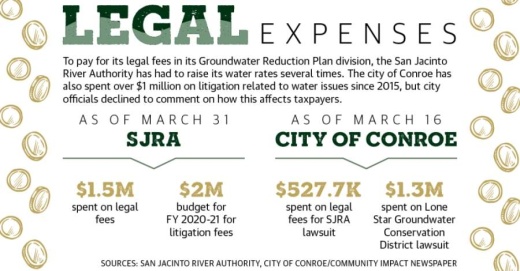Depending on how lawsuits pan out, the San Jacinto River Authority—an entity that sells surface water from Lake Conroe to Conroe and other entities in Montgomery County—may increase its rates next fiscal year by up to 14.5%.
Meanwhile, Conroe residents have been footing rising SJRA fees even though the city has not paid full rates since 2016.
The SJRA has been paying legal fees since 2016 due to a water rate lawsuit against private utility provider Quadvest, and the cities of Conroe and Magnolia; an antitrust case filed against the SJRA by Quadvest in 2019; and a water line leak case this year.
As of March 31, the SJRA has spent $1.5 million on legal fees on these cases so far within its Groundwater Reduction Plan division and expects to spend another $500,000 this fiscal year. These legal fees are driving up costs for water users, officials said.
For fiscal year 2020-21, which starts in September, the SJRA is budgeting about $2 million for litigation fees within the GRP division, SJRA General Manager Jace Houston said.
Legal fees are one factor for rising water rates. In 2015, the SJRA’s groundwater pumpage fee was $2.25 per 1,000 gallons, and the surface water fee was $2.44 per 1,000 gallons. Those numbers are now $2.73 and $3.15, respectively, although cities and water providers can charge more. A 1-cent rise in rates generates about $220,000 for the SJRA, Houston said.
“The rates have been set at as low an amount we can,” Houston said. “The rate that we charge the customers has to be a little higher to generate the revenue to cover those legal expenses.”
Users could absorb costs
At its April 20 meeting, SJRA Deputy General Manager Ron Kelling presented four scenarios on possible rate increases based on legal outcomes, which range from a 0.4% to a 14.5% increase. The rates will be set May 26 and approved, along with the FY 2020-21 budget, on June 22.
But Quadvest President Simon Sequeria alleges in a lawsuit the SJRA monopolized surface water resources and has been unfairly raising its rates, forcing entities bound by what he believes are invalid contracts to pay more than anticipated. Sequeria said he has spent about $1 million on lawsuits, which he said he has not raised his rates for.
“We are not going to let the SJRA get away with these abuses," Sequeria said in an email.
Residents living in Conroe and several other areas whose water bill includes an SJRA fee will likely absorb the increase.
“Taxpayers seem to be at the bottom; we are paying for litigation,” Crighton Ridge resident Nick Vonas said. “My concern is all these rates are continuing to escalate everywhere.”
Jim Stinson, general manager for The Woodlands Water Agency, the central management agency for the municipal utility districts that serve The Woodlands, said SJRA fees typically make up about one third of its residential customers water bills. At its May 13 meeting, the WWA board voted to direct its Woodlands Groundwater Reduction Plan representative to vote to not pay for anticipated increased SJRA rates related to legal fees or budget shortfalls due to other entities not paying their share.
Meanwhile, the city of Conroe has spent nearly $1.9 million on litigation regarding water lawsuits and has steadily been raising its water rates since at least FY 2009-10.
SJRA rate scenarios
In 2010, the city of Conroe and a number of other large-volume water users countywide entered into an agreement with the SJRA to reduce their groundwater usage to 70% of their 2009 totals by January 2016. To accomplish this, the entities agreed to pay for a $497 million project to build a surface water treatment plant and water pipe transmission system, acquire land and hire personnel, according to SJRA. To fund and maintain the plant and its operation, the SJRA has steadily raised its rates over the years.
However, the cities of Conroe and Magnolia have refused to pay rate increases since May 2016, when the SJRA voted to increase the water usage rate by 18 cents per 1,000 gallons. In response, the SJRA filed a lawsuit against the cities.
According to the SJRA, the cities of Conroe and Magnolia—which have been paying 2016 rates—owe the SJRA a total of $4.78 million and $252,397, respectively, as of March 31. The city of Conroe would owe SJRA a total of $5.66 million by Aug. 31, while Magnolia would owe $237,387.
Rate increases next year depend on a variety of factors. In Scenario A as outlined by Kelling, Conroe and Magnolia pay all their past dues from FY 2019-20 and begin to pay the full SJRA rate; the rate case is dropped; the anti-trust case is dismissed; and the water line case is dropped. In this scenario, rates would increase by 0.4%, or about 1 cent.
“If you could close your eyes and think of a world where there are no lawsuits, ... you could operate as a normal utility,” Kelling said.
Scenario B would see a 3.7% increase. It is the same as Scenario A, except the Quadvest rate case is seen through trial, and the antitrust case goes through discovery, which is essentially the pretrial phase of a lawsuit. In a nutshell, the Quadvest antitrust lawsuit alleges the SJRA created a monopoly on water supplies in Montgomery County through its GRP by purchasing all available surface water resources in the region.
Kelling said it could cost the SJRA $700,000 just for the Quadvest rate case to go through trial.
Scenario C is the “status quo,” Kelling said. In this situation, none of the lawsuits are dropped or settled, and Conroe and Magnolia continue paying 2016 rates. In Scenario C, rates would increase by 14.5%, and other GRP participants would be forced to foot the higher rates, SJRA officials said.
A fourth scenario was also presented that involved reducing surface water production and would lead to an 11.5% increase in rates.
Conroe’s water rates
Beginning in FY 2009-10, Conroe implemented a surface water conversion fee as part of its agreement with the SJRA. Although Conroe continues to pay the SJRA’s 2016 rates, Conroe’s surface water fee for residents has risen from 50 cents per 1,000 gallons in FY 2009-10 to $2.85 in FY 2016-17 to $3.40 in FY 2019-20, according to city budgets. In 2016, the SJRA’s surface water fee was $2.69 per 1,000 gallons.
Assistant City Administrator Steve Williams said in an email the difference between the rate charged to city customers and that sent to the SJRA is held in a separate account pending the outcome of the litigation.
Conroe has also steadily raised its base water rates. In FY 2009-10, the city’s minimum charge was $2 per 1,000 gallons. By FY 2019-20, that had increased to $2.66, according to city budgets. Williams said rates have increased due to various rising costs as well as the need to replace aging infrastructure.
Conroe has spent $572,700 on legal fees related to the SJRA as of March 16, according to information obtained from an open records request with the city. The city has also spent nearly $1.3 million on a lawsuit against the Lone Star Groundwater Conservation District, the entity that regulates groundwater resources in the county, that was settled in January 2019.
Because they are in litigation, city officials declined to comment on how these legal fees affect taxpayers.
“The council expects to continue paying the SJRA surface water and pumping fees at the frozen levels and will continue to hold the difference for future payment,” Conroe City Attorney Marcus Winberry said.
Webb Melder, former mayor of Conroe and former LSGCD president, said he supported the plaintiffs.
“The plaintiffs ... did not create this problem,” he said. “They are defending their family businesses, their constitutional rights and their private property rights, and the SJRA continues to beat them over the head and lay all the blame on them.”






